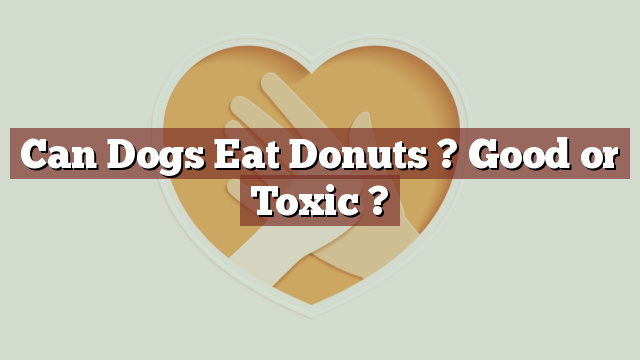Can Dogs Eat Donuts? Good or Toxic?
As responsible pet owners, it is crucial to be aware of what foods are safe for our furry friends. Dogs are part of the family, and their health and well-being should be a top priority. One common treat that many of us enjoy is donuts. But can dogs indulge in this sugary delight? Let’s dive into the topic and uncover the truth about dogs and donuts.
Nutritional Value of Donuts: Calories, Fat, Sugar, and More
Before we determine whether dogs can eat donuts, it is essential to understand the nutritional composition of these tempting pastries. Donuts are typically high in calories, fat, and sugar. They often contain unhealthy trans fats and can be quite heavy on the stomach. These sweet treats are not exactly a nutritional powerhouse for humans, let alone our canine companions.
Can Dogs Eat Donuts? Unveiling the Truth About Their Safety
Can dogs eat donuts? The answer is no, dogs should not consume donuts. While a small nibble now and then may not cause immediate harm, donuts are not suitable for regular canine consumption.
Scientific and veterinary insights suggest that donuts can contribute to various health issues in dogs. The high sugar content can lead to obesity, diabetes, and dental problems. The excessive fat content can result in pancreatitis, a painful condition that affects the pancreas. Furthermore, the artificial ingredients and preservatives found in donuts can cause gastrointestinal upset or allergic reactions in dogs.
Potential Risks and Benefits of Feeding Donuts to Dogs
Feeding donuts to dogs can have several potential risks and virtually no benefits. The high sugar content can lead to weight gain and obesity, which can cause various health complications in dogs, just as it does in humans. Obesity increases the risk of heart disease, joint problems, and even certain types of cancers. Additionally, the excessive fat in donuts can lead to pancreatitis, an inflammation of the pancreas that can be life-threatening if not promptly treated.
On the other hand, there are no significant benefits to feeding donuts to dogs. Dogs have different dietary needs compared to humans, and their bodies are not designed to process sugary and fatty foods like donuts. A well-balanced diet consisting of high-quality dog food and appropriate dog treats is the key to ensuring their optimal health and longevity.
My Dog Ate a Donut! What Should I Do? Step-by-Step Guide
If your dog accidentally consumes a donut, it’s essential to act promptly. Follow this step-by-step guide to ensure your furry friend’s safety:
- Stay calm and assess the situation. Determine the quantity and type of donut consumed.
- Take note of any visible changes in your dog’s behavior or health.
- Contact your veterinarian immediately. Provide them with all the necessary details.
- Follow the guidance provided by your veterinarian. They may recommend monitoring your dog at home or bringing them in for an examination, depending on the situation.
Remember, it is always better to be safe than sorry. Seeking professional advice from a veterinarian is crucial, especially if your dog has ingested a significant amount of donuts or is showing signs of distress.
Conclusion: Dogs and Donuts – Proceed with Caution for Optimal Health
In conclusion, it is best to avoid feeding donuts to dogs altogether. While the occasional small nibble may not cause immediate harm, the long-term health risks associated with donuts outweigh any potential benefits. Donuts contain excessive sugars, unhealthy fats, and artificial ingredients that can lead to obesity, diabetes, pancreatitis, and other health issues in dogs.
As responsible pet owners, we should prioritize our dogs’ health and well-being by providing them with a balanced diet tailored to their specific needs. Opt for high-quality dog food and appropriate dog treats that are formulated to promote their optimal health. And remember, when it comes to dogs and donuts, proceed with caution for their lasting well-being.
Thank you for investing your time in exploring [page_title] on Can-Eat.org. Our goal is to provide readers like you with thorough and reliable information about various dietary topics. Each article, including [page_title], stems from diligent research and a passion for understanding the nuances of our food choices. We believe that knowledge is a vital step towards making informed and healthy decisions. However, while "[page_title]" sheds light on its specific topic, it's crucial to remember that everyone's body reacts differently to foods and dietary changes. What might be beneficial for one person could have different effects on another. Before you consider integrating suggestions or insights from "[page_title]" into your diet, it's always wise to consult with a nutritionist or healthcare professional. Their specialized knowledge ensures that you're making choices best suited to your individual health needs. As you navigate [page_title], be mindful of potential allergies, intolerances, or unique dietary requirements you may have. No singular article can capture the vast diversity of human health, and individualized guidance is invaluable. The content provided in [page_title] serves as a general guide. It is not, by any means, a substitute for personalized medical or nutritional advice. Your health should always be the top priority, and professional guidance is the best path forward. In your journey towards a balanced and nutritious lifestyle, we hope that [page_title] serves as a helpful stepping stone. Remember, informed decisions lead to healthier outcomes. Thank you for trusting Can-Eat.org. Continue exploring, learning, and prioritizing your health. Cheers to a well-informed and healthier future!

